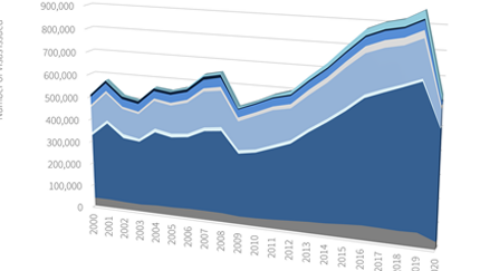Fact Sheet

What Immigration Reform Could Mean for the U.S. Economy
Now more than ever, Americans are seeking real solutions to our nation’s problems, and there is no better place to start than protecting our workers, raising wages, and getting our economy moving again. Part of this massive effort must include workable answers to our critically important immigration problems. Read More

Employment-Based Visa Categories in the United States
Current U.S. immigration law provides several paths for foreign workers to enter the United States for employment purposes on a temporary or permanent basis. This fact sheet provides basic information about how the employment-based U.S. immigration system works. Read More

How Expanding E-Verify in the Stimulus Bill Would Hurt American Workers and Business
Expanding mandatory E-Verify as part of the stimulus package would threaten the jobs of thousands of U.S. citizens, decrease productivity, saddle U.S. businesses with additional costs, and hinder the Social Security Administration’s (SSA) ability to provide benefits to needy and deserving Americans – all at a time when we need to stimulate our economy. The fact is: expanding E-Verify now would decelerate the Stimulus Package and slow America’s economic recovery. Read More

The New Electoral Landscape and What It Means for Immigration Reform
IPC has compiled this one-stop analysis of all the available data on the Asian, Latino and New American vote and shows how and why they voted the way they did in the 2008 election cycle. The report features a variety of early, exit and election-day polling which tells the story of not only a record rate turnout, but also provides insight into the greatest areas of concern for these voters. It also explores early signals from the new administration and congress with respect to immigration reform. The 2008 elections clearly demonstrated the growing power of the Latino, Asian, and immigrant vote. Not only did these groups turn out in record numbers, they also overwhelmingly rejected anti-immigrant politicians who attempted to use immigration as a wedge issue through hateful campaign rhetoric that is quickly becoming an unhealthy trademark of the Republican Party. The following report illustrates the growing electoral clout of Latinos, Asians, and New Americans; provides data on how and why they voted; and demonstrates that immigration was an issue that motivated them to the polls. Election results from races in which immigration was a hot issue show that immigrant-bashing did not work as a campaign strategy. The report also provides evidence that a majority of all voters favor comprehensive immigration reform, and details early signs from the incoming administration and Congress that point to a new direction in immigration policy. Politicians of all stripes would be wise to listen to the voices of ethnic and New American voters and not take them for granted. The analysis provided in the following pages points to the strength and growth of what may be the most important voting bloc in 21st century politics—one that now has the power profoundly to change American elections in the years to come. Read More

Did My Family Really Come “Legally”?
Many people assume that their family immigrated to the United States legally, or did it “the right way.” In most cases, this statement does not reflect the fact that the U.S. immigration system was very different in the past and that their families might not have been allowed to enter had today’s laws been in effect. Read More

Election 2008 Recap: The Electoral Landscape and What it Means for Immigration Reform
IPC has prepared a fact sheet to remind policymakers, the press, and the public about the enormous influence of the immigrant, Latino, and Asian vote in the 2008 elections. Read More

Election 2008: The Importance of Latinos and Immigrants to the Economies and Electorates of the “Super Tuesday” States
During the presidential primaries, candidates and the media focused a great deal of attention on the debate over how immigrants impact state economies and the fiscal balance of state treasuries. At the same time, political pundits and pollsters speculated on the electoral influence of immigrants and Latinos at the voting booth. Below is a brief analysis of the impact that both Latinos and immigrants have on the economies and electorates of the “Super Tuesday” states. Read More

Money for Nothing: Immigration Enforcement without Immigration Reform Doesn’t Work
While the U.S. government has poured billions upon billions of dollars into immigration enforcement, the number of undocumented immigrants in the United States has increased dramatically. Rather than reducing undocumented immigration, this enforcement-without-reform strategy has diverted the resources and attention of federal authorities to the pursuit of undocumented immigrants who are drawn here by the labor needs of our own economy. Read More

The Politics of Contradiction: Immigration Enforcement vs. Economic Integration
Since the mid-1980s, the federal government has tried repeatedly, without success, to stem the flow of undocumented immigrants to the United States with immigration-enforcement initiatives: deploying more agents, fences, flood lights, aircraft, cameras, and sensors along the southwest border with Mexico; increasing the number of worksite raids and arrests conducted throughout the country; expanding detention facilities to accommodate the hundreds of thousands of undocumented immigrants apprehended each year; and creating new bureaucratic procedures to expedite the return of detained immigrants to their home countries. At the same time, the economic integration of North America, the western hemisphere, and the world has accelerated, facilitating the rapid movement of goods, services, capital, information, and people across international borders. Moreover, the U.S. economy demands more workers at both the high-skilled and less-skilled ends of the occupational spectrum than the rapidly aging, native-born population provides. The U.S. government’s enforcement-without-reform approach to undocumented immigration has created an unsustainable contradiction between U.S. immigration policy and the U.S. economy. So far, the economy is winning. Read More

Immigration and the Elderly: Foreign-Born Workers in Long-Term Care
Aging populations and the growing need to provide long-term care to the elderly are among the leading demographic, political, and social challenges facing industrialized countries, including the United States. As of 2004, 34.7 million people in this country had lived to their 65th birthday or beyond, accounting for about 12 percent of the U.S. population. Nearly 90 percent of the elderly population is native-born. By 2030, the number of older people in the United States is likely to double, reaching 72 million—or nearly one out of every five people. The aging of larger numbers of Americans will require significant increases in financial and human resources for healthcare support and other social services. As a result, immigrants will continue to play a significant role in the growth of the U.S. labor force in general and of the direct-care workforce in particular. It is in the best interests of long-term care clients, providers, and workers if governments and private donors foster high-quality training and placement programs rather than leaving the future of the direct-care industry to chance. Read More
Make a contribution
Make a direct impact on the lives of immigrants.
